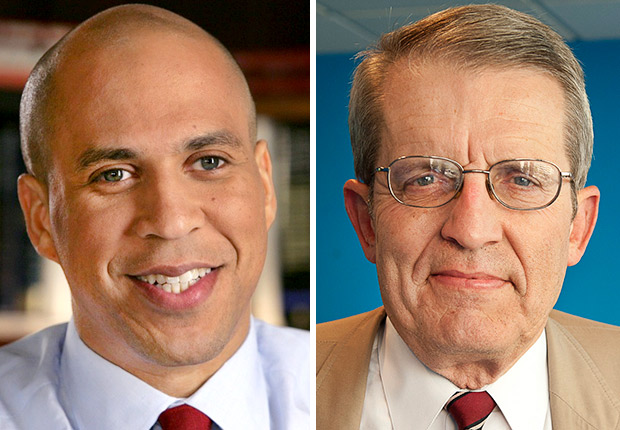AARP Hearing Center

By Christina Hernandez Sherwood
New Jersey voters face a choice on Nov. 4 in the U.S. Senate race between incumbent Cory Booker, a Democrat, and Republican challenger Jeff Bell. The candidates have differing views on issues important to older voters, such as the future of Social Security and Medicare.
Booker, 45, won an October 2013 special election to complete the term of the late Sen. Frank Lautenberg (D). Before becoming senator, he had been Newark’s mayor since 2006.
Bell, 70, a policy consultant who was an economic adviser to President Ronald Reagan, previously ran for the Senate in 1978 and 1982.
In an interview with the AARP Bulletin, Bell said that he opposes significant changes to Social Security, calling it “one of the best-structured programs of the New Deal.” He said he opposes privatization, but that he would propose a 20 percent cut to the Social Security portion of the payroll tax.
Bell said this would rebalance the system. Those who benefit from the tax cut would see less growth in future benefits because they had put less into the system, while current beneficiaries would not be affected, he said.
“It’s very important to preserve the structure of Social Security the way it is,” Bell said, “to not play around with fundamental changes in how the taxes are collected or the benefits are received.”
Booker, in an email response to the Bulletin, said he is evaluating several Social Security reform ideas. “The most compelling I have heard is raising the payroll tax cap,” currently set at $117,000, “so that the wealthiest Americans will pay a little bit more to help secure the system for all.”
Booker said he would not support cuts for Social Security beneficiaries or privatization of the program: “I will not jeopardize the economic security of seniors with untested schemes that stand to harm today’s beneficiaries or undermine our commitment to tomorrow’s.”
Differences on Medicare
Booker said Medicare is a vital program to protect. The key, he said, is reducing overall health care costs by providing incentives for quality care, among other methods.
“As we continue to implement the Affordable Care Act,” Booker said, “we need to push for additional ways to drive down the cost of care so our seniors can continue to have the access to the high-quality care they deserve.”
Bell, on the other hand, said he would support repeal of the Affordable Care Act, which he believes limits some options for Medicare Advantage enrollees and others.
Instead, Bell prefers the “premium support” approach outlined by Rep. Paul Ryan (R) of Wisconsin. Under that plan, future retirees would receive a payment from Medicare to offset the cost of a private insurance plan of their choice. Current Medicare beneficiaries would remain in the existing system.
Despite their differences, the candidates agree that bipartisanship is the key to ending the gridlock in Congress. Both men say they have a history of working across the aisle.
Booker said he is willing to work with anyone, regardless of party, to advance New Jersey’s interests. “I’ve already done that many times over,” he said, noting his work with Senate Republicans Tim Scott, Jeff Flake, Rand Paul and Marco Rubio. “We disagree on most things, but we found common ground where we could.”
Bell, who was defeated in his 1978 bid for the Senate by Democrat Bill Bradley, later worked with his opponent on the bipartisan Tax Reform Act of 1986. “I have a track record of working in a bipartisan fashion,” Bell said.
For more information on state and federal candidates’ positions on issues of interest to older voters, consult the voter guide at aarp.org/yourvote.
AARP does not endorse candidates, contribute to campaigns or favor political parties.
Christina Hernandez Sherwood is a writer living in Collingswood, NJ.































































